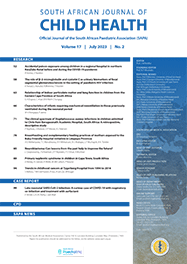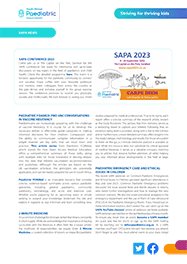Hot Topics

How to change perceptions on feeding in neonatal care
Abstract
By conducting focus group discussions with nurses, mothers and counsellors and teasing out the confusions and misconceptions, relevant information was imparted to the groups to allow them to re-consider their misconceptions.
Within a period of 2 months nurses were confident about re-counselling mothers with respect to appropriate feeding choices. HIV-positive mothers were trained to flash-heat their milk. Subsequently, policies for the unit were derived from the focus group discussions. In addition, regional hospitals in the Durban area (eThekweni) considered the introduction of flash-heating to their units.
The South African Department of Health opted for infants to receive prophylaxis with daily nevirapine as long as they are breastfed, and the Nutrition Directorate decided to withdraw the issue of free replacement feeds in HIV-exposed babies. KZN was the first province to institute this policy. The Department of Health has recommended that neonatal units no longer encourage HIV-infected mothers to flash-heat their breastmilk unless the infant is not receiving ARV prophylaxis or the mother is not on treatment.
Authors' affiliations
M Adhikari, Research Co-ordinator, Postgraduate Office, School of Clinical Medicine, Nelson R Mandela School of Medicine, University of KwaZulu-Natal, Durban
A Coutsoudis, Department of Paediatrics and Child Health, Nelson R Mandela School of Medicine, University of KwaZulu-Natal, Durban
Cite this article
Article History
Date published: 2013-01-22
Article Views
Full text views: 4152

.jpg)



Comments on this article
*Read our policy for posting comments here